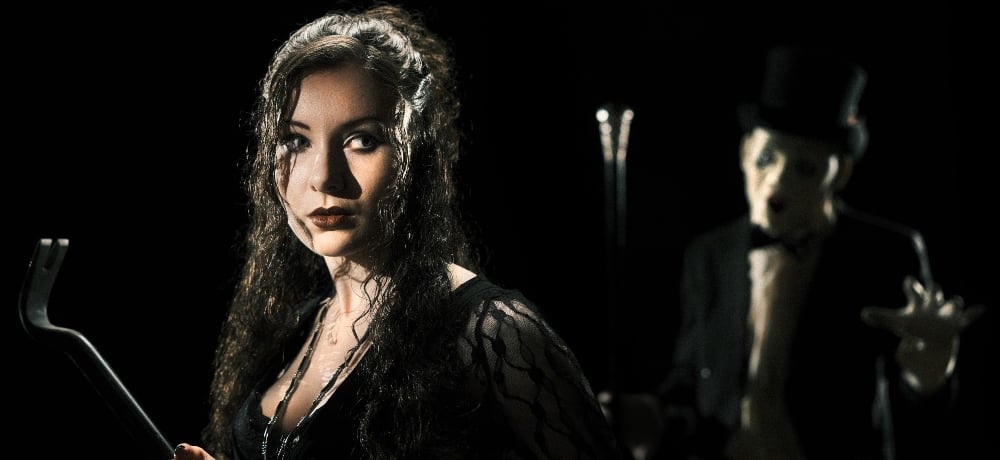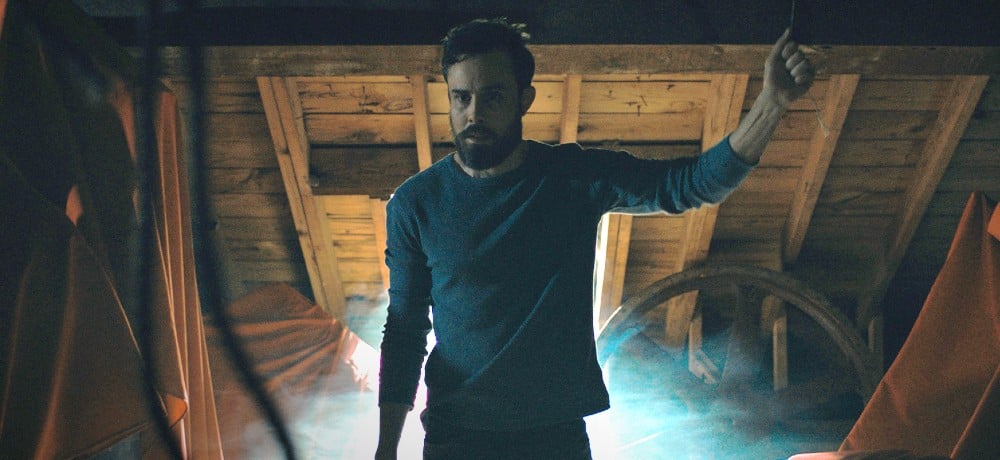






How many more horror genre interpretations of “[negative emotion] is a monster” can you stomach? Well, make room for one more. J.C. Doler’s The Twin brings Irish folklore into a heartbreaking drama about every parent’s ultimate fear. Themes and symbolism are plain as day, and yet Doler successfully pulls genuine empathy from the simplest “Trauma Horror” formula. The film never plays dumb, valuing honest conversations about therapy, accountability, and the frightening depths where our darkest thoughts lurk. It’s no Relic or Anguish (2015), but The Twin tells a bitter tale of headstones and doppelgängers worth a Shudder stream.
Artist Nicholas (Logan Donovan) is a proud father and loving husband, but tragedy will soon change all that. His wife, Charlie (Aleksa Palladino), leaves Nicholas and his curly-haired, adorable son Jacob (Tripp Toupal) at home together. Disaster strikes, and while Nicholas is painting, Jacob accidentally falls down their wooden staircase and is found dead. Nicholas cannot live with himself, and a myth from his childhood reawakens: The Fetch. Described as a supernatural double, Fetches supposedly appear when someone is knocking on Death’s doorstep. At times, Nicholas feels like he should die anyway—but with Charlie’s help, as well as his hired therapist, Dr. Beaumont (Robert Longstreet), Nicholas may be able to beat the evil lookalike in his head.
Doler and co-writer Paul Petersen aim for Hallmark suburbia with a hellish twist, which leans into theatrical drama over hard genre awfulness. This isn’t Halloween Ends or Feast, where you’ll watch a child brutally perish. The Twin is careful to emphasize the pain and sorrow of impossible guilt as told through Nicholas’ battle with his inhuman self over sensationalized violence. It makes for a ho-hum slice of humble Americana that isn’t overwhelmingly terrifying, but Doler doesn’t waste his chances to say something meaningful about Nicholas’ situation. What he feels is valid, and that’s supposed to be complicated—Doler’s written dialogue speaks in compassionate truths.
That’s not to say The Twin fumbles its scare tactics. The concept of a “Fetch” flips the switch on innocent grannies in an opening flashback to Nicholas’ childhood, and then there’s the dead-eyed version of Nicholas, with black sludge dripping from his mouth. Nicholas is left to fight his demons alone, so it’s not like Charlie’s there to aid—she’s coping and healing on separate terms. This leads to nightly whispers of ominous voices, snarling entities crunched into hiding spots, and manipulation of the dark as Nicholas tries to evade his toxic half. It’s nothing groundbreaking, playing hide-and-seek with shadows like we’ve seen before, but works within the confines of rehabilitation. Nicholas sees himself as a monster, and that sometimes is jarring enough.
What shines is the relationship between Nicholas and Dr. Beaumont, a visiting caretaker who doesn’t have time for his patient’s frustrated shoo-away attempts. Longstreet is a crackerjack choice for the role, bringing this zero bullshit attitude that’s never confrontational, just not falling for a clearly broken Nicholas’ guarded song and dance. The adage “Your trauma isn’t your fault, but healing is your responsibility” plays a huge part in their sessions, which is such a critical depiction that often goes overlooked. Movies operate in clean storytelling, with starts and finishes, where mental health issues are sometimes eternal. Dr. Beaumont is more than just your stock therapist supporting character, which Longstreet plays beautifully as a balm to Nicholas’ manifestation of his dangerous and devastating thoughts.
The Twin gets murkier in its finale when Doler backs himself into a corner and must hit the escape button for a traditionally “fulfilling” end. However, his film still gets a passing grade for its prior treatment of suffocating mental conditions. It’s frightening enough and bears similarities to small-town folklore with a devilish punch like The Wretched. Robert Longstreet walks away as the cast’s MVP, shouldering the immense weights of grief and blame to summon these sun-kissed glimpses of hope through clouds of sorrow. Ignore the generic packaging and boilerplate concept, because The Twin has more to offer than just another monster born from emotional turmoil.
Movie Score: 3/5